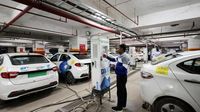In a significant shift within the electric vehicle (EV) ride-hailing sector, BluSmart Mobility, an Indian startup founded in 2019, is exiting its core ride-hailing business to become a fleet partner for Uber. This strategic pivot comes as BluSmart grapples with severe financial challenges, including a cash burn exceeding ₹20 crore monthly.
Founded by Anmol Singh, Punit K Goyal, and Punet Singh Jaggi in Gurugram, BluSmart has been a trailblazer in the EV market, launching its services in July 2020 with hourly electric car rentals priced at ₹199. The startup quickly gained traction, raising $3 million in angel funding in 2019, followed by a pre-Series A round of $7.8 million in August 2020. By 2022, BluSmart had expanded its operations to Bengaluru and had established a fleet of over 5,000 electric vehicles (EVs) by September 2023.
Despite its rapid growth, the company faced mounting pressures, including a substantial debt crisis at Gensol Engineering, a company also co-founded by the Jaggi brothers. This financial strain has led to discussions between BluSmart and Uber for a hybrid model that would allow BluSmart drivers to accept ride requests from both platforms. Sources indicate this deal aims to bolster Uber's EV service, Uber Green, which was launched in 2023 with a goal of deploying 25,000 electric cars through partner fleets.
Under the new arrangement, cars owned or leased by BluSmart will be listed on the Uber platform, allowing BluSmart to earn a portion of the fares generated. Uber will retain its standard commission from these transactions, similar to its agreements with other fleet operators. A mobility expert, who chose to remain anonymous, emphasized that any platform aiming to operate an EV-based ride-hailing service would ideally need a fleet of 30,000 to 40,000 vehicles per state to be competitive.
As BluSmart transitions to this hybrid model, it is not just about survival; it represents a strategic adaptation to a rapidly changing market landscape. The startup's journey has been marked by significant funding rounds, including a notable $25 million in 2022 and another $42 million in 2023, which helped sustain its operations amid rising operational costs. However, with the cash crunch intensifying, the decision to partner with Uber reflects a pragmatic approach to ensure drivers have access to a broader pool of ride opportunities.
In January 2024, BluSmart secured $25 million from Zurich-based climate finance firm ResponsAbility to expand its EV charging infrastructure. This funding, along with a new pricing structure that increased fares during peak hours, was part of the company's effort to adapt to market demands. By April 2024, BluSmart reported revenues exceeding ₹390 crore for the financial year 2024, a significant increase from ₹160 crore in the previous year.
However, the financial health of Gensol Engineering, which owns over 5,000 of BluSmart's vehicles, has raised concerns about the startup's future. The debt crisis at Gensol has made it increasingly challenging for BluSmart to secure the necessary capital to invest in its fleet and operations. As a result, the collaboration with Uber is seen as a lifeline, enabling BluSmart to leverage Uber's established platform while still maintaining its identity in the EV market.
With this partnership, BluSmart aims to enhance its operational efficiency and provide a more extensive service offering to its drivers and customers. The deal is expected to allow BluSmart drivers to tap into a larger pool of ride requests, potentially increasing their earnings while contributing to a more sustainable transportation ecosystem.
As the EV ride-hailing landscape continues to evolve, the collaboration between BluSmart and Uber could set a precedent for other startups facing similar challenges in the industry. By aligning with a major player like Uber, BluSmart not only secures its position in the market but also reinforces the importance of sustainability in urban transportation.
Looking ahead, BluSmart's focus on solar energy to power its fleet, in partnership with Tata Power, aligns with global trends towards greener solutions. The company's commitment to sustainability and innovation has positioned it as a key player in India's transition to electric mobility.
In summary, BluSmart's strategic shift to partner with Uber marks a pivotal moment in its journey. While the challenges of financial sustainability remain, this collaboration could provide the necessary support for BluSmart to thrive in a competitive market, ultimately benefiting drivers and riders alike.






